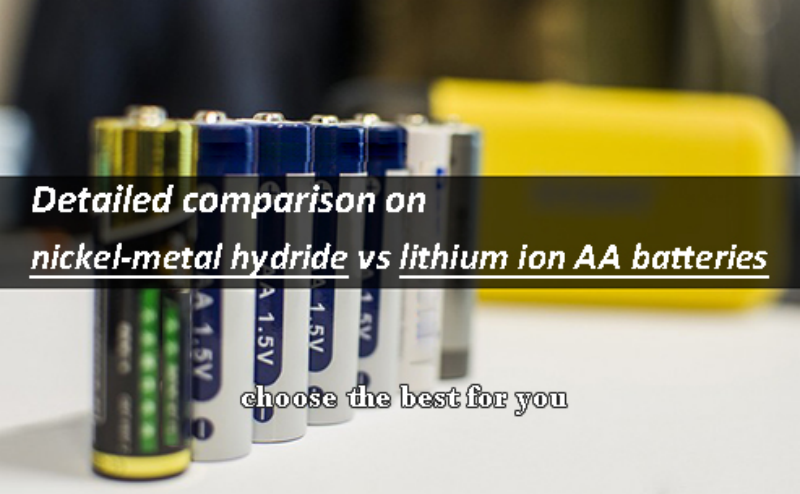
Main content:
- What is a nickel-metal hydride battery? FAQs about nickel-metal hydride batteries
- Are nickel metal hydride batteries lithium?
- How long do nickel-metal hydride batteries last?
- What are the advantages and disadvantages of NiMH batteries?
- Can you overcharge a nickel metal hydride battery?
- What is AA mean in battery? What type of AA battery is best?
- Frequently Asked Questions about lithium-ion AA batteries
- Which one to choose when comparing nickel-metal hydride vs lithium ion AA batteries?
- What is the difference between a lithium-ion AA and a NiMH battery?
- Are lithium AA batteries better than NiMH?
- Comparative analysis of nickel metal hydride batteries and lithium batteries
Which type of battery is better for your electronic devices, nickel-metal hydride vs lithium ion AA batteries? This question can be tough to answer, as both have their benefits and drawbacks. In recent years, lithium ion AA battery have become more popular than nickel-metal hydride battery. That said, many still believe that NiMH battery is the better option. In this article, we'll compare nickel-metal hydride vs lithium ion AA batteries in terms of performance, power, life, cost, and sustainability.So which type of battery is the best? In this unbiased comparison, we'll take a closer look at these two types of batteries and help you decide which is best for you.
1.What is a nickel-metal hydride battery? FAQs about nickel-metal hydride batteries
A nickel metal hydride battery, also known as NiMH battery. You can recharge the NiMH battery. It makes use of nickel oxyhydroxide along with metal hydride as an electrode. Below you will find all the answers to the questions you have in mind about NiMH batteries.
① Are nickel metal hydride batteries lithium?
No, nickel metal hydride batteries are not lithium. The cells of lithium are small and lightweight in comparison to cells of NiMH battery because lithium batteries have higher energy density. The average energy density of lithium cells is above 160wh/kg, while NiMH cells' average is only 40-70wh/kg. Under the same volume, lithium batteries can provide devices with longer endurance.
② How long do nickel-metal hydride batteries last?
You can recharge NiMH batteries as many times as you want. This makes NiMH almost equal to several alkaline batteries in service they offer throughout life. In general, the life of NiMH batteries is more than one year.
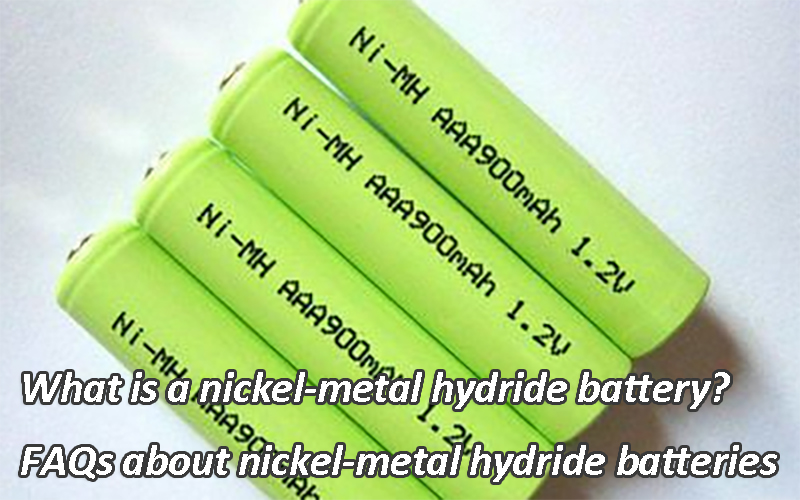
③ What are the advantages and disadvantages of NiMH batteries?
The key advantages associated with NiMH batteries are as follows:
- A large number of metal materials are used inside the nickel-metal hydride battery, which has good electrical conductivity and can adapt to high-power discharge;
- Higher power density compared to alkaline batteries is what makes them stand out;
- The management system of NiMH battery is relatively simple, and the battery has strong resistance to overcharge and overdischarge. During the charging process, the battery can achieve self-balancing through the side reaction of consuming gas (oxygen), and it is not necessary to use a special balancing circuit.
Some of the key disadvantages associated with NiMH batteries include:
- The cost of these batteries is high in comparison to Nickle Cadmium batteries. A large number of more precious metals such as nickel and cobalt are used in nickel-metal hydride batteries, which makes the cost of battery raw materials relatively high;
- The specific energy of nickel-metal hydride batteries is 2 to 3 times that of lead-acid batteries, generally 50 to 70Wh/kg, but still much lower than that of lithium-ion batteries;
- The high-temperature charging performance of NiMH batteries is poor, and the charging efficiency will decrease at high temperatures, and the decrease in reaction efficiency will further increase the battery temperature, which may eventually lead to thermal runaway and safety problems;
- Quick discharging ability. Among the commonly used lead-acid, nickel-metal hydride and lithium batteries, NiMH batteries have a higher self discharge rate. Generally, the self-discharge rate of nickel-metal hydride batteries reaches 10% to 30% after being fully charged and left at room temperature for 28 days, which is much than the self-discharge rate of only 3.5% per month for lithium-ion batteries.
④ Can you overcharge a nickel metal hydride battery?
No, you can't overcharge a NiMH battery. When the nickel-metal hydride battery is overcharged, due to the precipitation of more hydrogen gas, and the oxygen cannot be effectively consumed by the negative electrode, the internal pressure will rise rapidly, and the battery will eventually leak.
2.What is AA mean in battery? What type of AA battery is best?
AA is used to specify the battery size. It represents the size of the battery and the potential to which you can charge it. Generally speaking, AA battery refers to a type of cylindrical battery with a diameter of 14mm and a height of 49mm. You can use this cell in multiple electronics, it is commonly found in many small appliances and digital products. The lithium ion AA battery is the best. The reasons that make this battery the best include:
- The battery cycle of ithium ion AA batteries will up to 1,000 times before 80% DOD with their full efficiency if they are used in the operating temperature range of -20-to-60-degree;
- Can store up to 3500 mAh power;
- The higher energy density of Li-ion AA batteries makes them lighter than other batteries.
3.Frequently Asked Questions about lithium-ion AA batteries
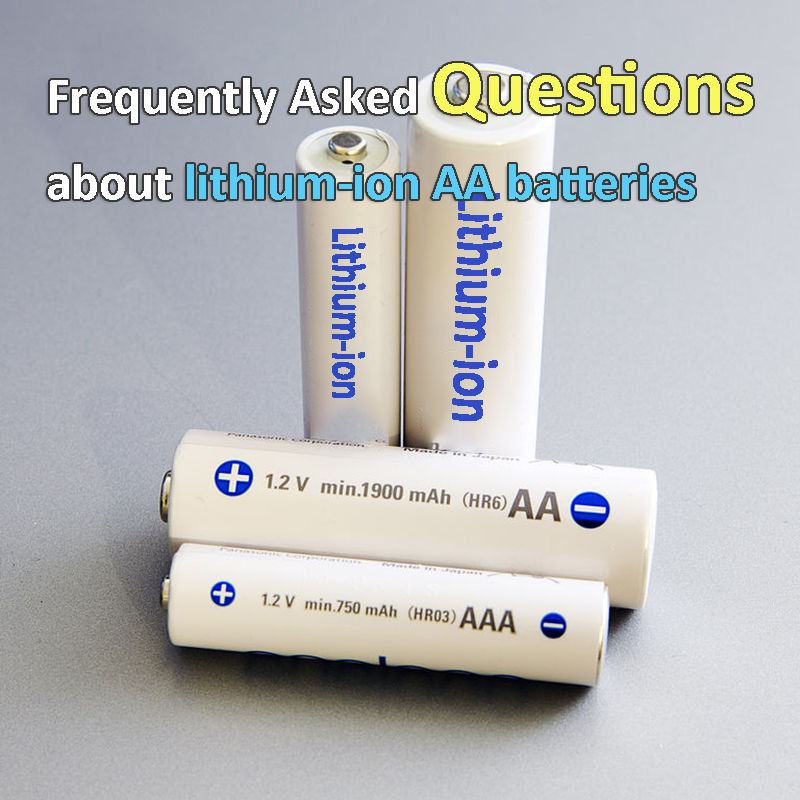
Now we will discuss Lithium ion AA batteries. You will find very helpful information about this device down below:
① How long do lithium AA batteries last?
Lithium-ion AA batteries are a long-lasting battery with a cycle life of 3 years and more if properly cared for and charged and discharged on time. In comparison, Li-ion AA batteries have a lower average daily cost than other batteries and are therefore more cost-effective.
② Are AA lithium-ion batteries rechargeable?
Yes, you can recharge lithium-ion batteries. The carbon and lithium act as electrodes of lithium-ion batteries, contributing to their light weight. These batteries can hold a large amount of charge. In case they are not used, they only lose 3.5 percent of what power they have each month. The difference between nickel-metal hydride vs lithium ion AA batteries will be compared in detail below.
4.Which one to choose when comparing nickel-metal hydride vs lithium ion AA batteries?
No one can say which one is the best, only the most suitable. Several differences exist between nickel-metal hydride vs lithium ion AA batteries.
① What is the difference between a lithium-ion AA and a NiMH battery?
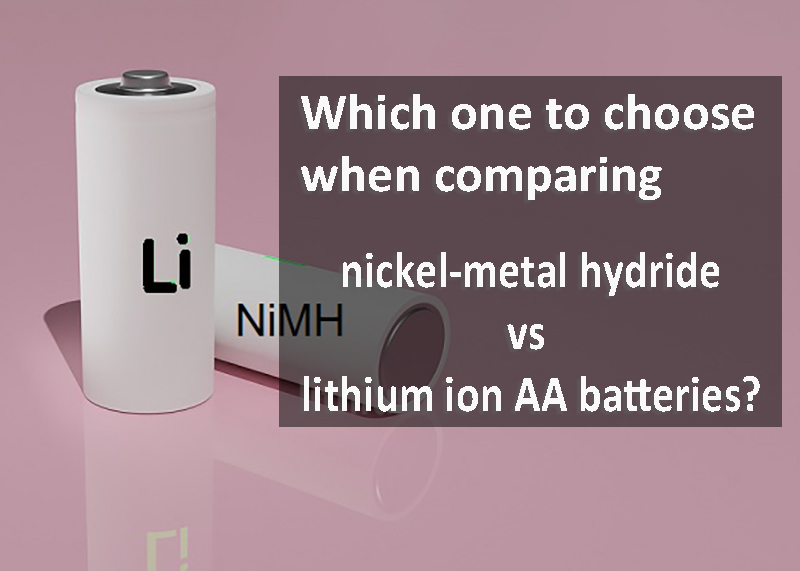
- Lithium-ion AA batteries have a lower self-discharge rate than NiMH batteries and have no memory effect;
- Lithium-ion AA batteries have a longer cycle life when nickel-metal hydride vs lithium ion AA batteries. NiMH lasts anywhere only 500 times, while lithium ion AA lasts up to 1,000 cycles;
- When comparing charging speeds of nickel-metal hydride vs lithium ion AA batteries, lithium wins than that over NiMH;
- Compared with NiMH batteries, lithium-ion batteries have higher output power.
② Are lithium AA batteries better than NiMH?
In comparing nickel-metal hydride vs lithium ion AA batteries, it is difficult to decide which lithium AA and NiMH battery are best because each has its pros and cons. Different situations demands different battery usage. The difference mentioned above helps you decide which one to choose as per your situation.
5.Comparative analysis of nickel metal hydride batteries and lithium batteries
You will find a helpful exhaustive analysis between NiMH and Lithium ion batteries. The analyses will help you to develop a clear concept regarding both of the batteries.
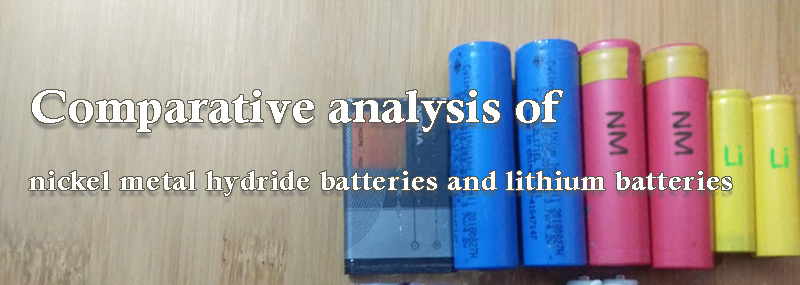
① Are NiMH and lithium batteries interchangeable?
This depends on what kind of device you are using. In most cases, you cannot change your lithium battery with a NiMH battery or vice versa. The reasons behind this include:
- Shape differences;
- Voltage differences;
- Size differences.
② Are nickel metal hydride batteries safer than lithium-ion?
Yes, NiMH batteries are thermally stable in comparison to traditional liquid lithium-ion batteries. However, the emergence of solid-state lithium battery technology will solve the hidden safety hazards of traditional lithium batteries, because the solid-state electrolyte is non-flammable, non-corrosive, non-volatile, and has no leakage problem, and overcomes the phenomenon of lithium dendrites, so it has extremely high safety.
③ Can I use lithium batteries instead of NiMH?
This is not feasible in the usual case, because the lithium batteries can supply high amounts of current to fulfill the requirement of the electrical equipment. So, this determines that you cannot use lithium-ion cells in place of NiMH because NiMH cannot meet the high current requirement. On the other hand, the application of lithium-ion battery technology in the field of energy storage(especially home energy storage) and many other fields is also irreplaceable by nickel-metal hydride batteries.
Related article: AGM vs flooded battery, li-ion vs ni-mh battery